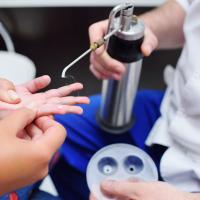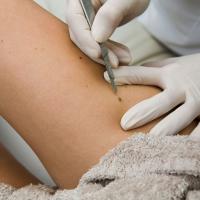Skin Checks
GP's practicing at GHFP perform skin checks, and skin surgery.
Your Skin Check will involve a thorough examination, with focused examination of any suspicious skin lesions using a dermatoscope (a hand-held magnification device). If required, clinical images of your skin lesions can be taken and stored securely in your medical record. Skin Check appointments are 30 minutes long.
Types of Skin Cancers
- Basal Cell Carcinoma (BCC)
- Squamous Cell Carcinoma (SCC)
- Melanoma
- Other
BCCs and SCCs need to be removed because they will continue to grow larger, sometimes causing serious disfiguration and erosion of important tissues.
Melanoma needs to be removed because it can spread and metastasize, becoming life-threatening.
You are at increased risk of skin cancer if:
- You had high UV exposure and episodes of sunburn in childhood
- You are male
- You are over 40 years old
- You have a family history of melanoma
- You have a fair complexion, or a tendency to burn rather than tan
- You have freckles, lots of moles
- You have light eye colour
- You have light or red hair colour
- You have had skin cancers before
It is recommended that people of increased risk of skin cancer have a Skin Check every 6 to 12 months.
It's also recommended that you examine your own skin about every 3 months.
Thinks to look for include:
- New skin lesions
- Changes in colour, size, or shape of skin lesions
- A skin lesion that becomes sore, itchy, or starts to bleed
See a GP promptly if you notice any of these changes.
Your GP will advise you of appropriate management of any concerning skin lesions.
Management of suspicious skin lesions may include:
- Cryotherapy with liquid nitrogen (also known as "dry ice")
- Diagnostic biopsy (surgical removal of a small part of a skin lesion to allow for histological diagnosis)
- Excision biopsy (full removal of a skin lesion to allow for histological diagnosis)
Any surgical procedures that are required will be planned at your Skin Check appointment.
Prevention of skin cancer is paramount. Just one or two episodes of bad sunburn in childhood can greatly increase your risk of skin cancer in later life. 95% of melanomas are caused by over-exposure to UV light.
Protect your skin, and your children's skin, from UV light:
- Avoid spending prolonged periods in the sun during the middle of the day
- Wear UV-protective clothing
- Use SPF30 or higher sunscreen on sun-exposed areas, and re-apply every 2 hours
- Wear a hat
- Seek shade
- Wear sunglasses to protect your eyes


